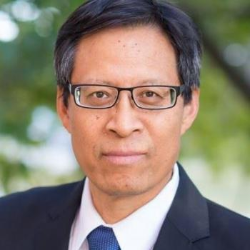Konstantin Born, Doctoral Candidate, Smith School of Enterprise and the Environment, University of Oxford
Kristi Disney Bruckner, Senior Policy Advisor, IRMA Initiative for Responsible Mining
Stefan Debruyne, Director of External Affairs, SQM International
Jarod Kelly, PhD, Principal Energy Systems Analyst, Systems Assessment Center, Argonne National Lab
Michael Wang, PhD, Group Center Director & Distinguished Fellow, Systems Assessment Center, Argonne National Lab
INSTRUCTOR BIOGRAPHIES:
 Konstantin Born, Doctoral Candidate, Smith School of Enterprise and the Environment, University of Oxford
Konstantin Born, Doctoral Candidate, Smith School of Enterprise and the Environment, University of Oxford
Konstantin Born is a researcher and doctoral candidate at the University of Oxford's Smith School of Enterprise and the Environment. His research explores the implications of the energy transition on the demand for minerals and metals and the role that circular economy strategies can play in extracting natural resources in more sustainable ways. Alongside his research, he works as an independent consultant for both private and public sector entities with a focus on mining governance, benefit sharing, and responsible sourcing of minerals. Konstantin holds an MSc in Development Management from the London School of Economics and Political Science and a BA in Economics and Political Science from McGill University, Canada.
 Kristi Disney Bruckner, Senior Policy Advisor, IRMA Initiative for Responsible Mining
Kristi Disney Bruckner, Senior Policy Advisor, IRMA Initiative for Responsible Mining
Kristi Disney Bruckner is an attorney with over 20 years of experience working on complex law and policy issues with governments, communities, companies, and multi-stakeholder initiatives. She is Law and Policy Director at the Initiative for Responsible Mining Assurance (IRMA) where she works with governments, civil society, and others to use IRMA’s best practice standards as a tool to improve mining sector governance and responsible sourcing, including for materials needed for renewable energy, electric vehicles, and other low-carbon technologies. Her experience includes over a decade of leadership at Sustainable Development Strategies Group, working to align management of renewable energy and natural resources with sustainable development objectives. She has worked with government, community, and industry stakeholders around the world to review and improve law and policy frameworks; build capacity to negotiate and manage natural resource contracts and company-community agreements; and advance the United Nations Sustainable Development Goals (SDGs). Her work has included research and co-authorship of Extractive Industries Transparency Initiative (EITI) validation reports for 16 countries, review of mining law and policies of over 70 jurisdictions, and review of community development requirements for the mining sector in over 50 countries. She has also worked with the Intergovernmental Forum on Mining, Minerals, Metals and Sustainable Development (IGF) to complete Mining Policy Framework Assessments, capacity building seminars, and guidance for IGF Members, including guidance on improving environmental and social impact assessment and management for the mining sector. She is an adjunct professor of climate change law, sustainable development and international trade, and community engagement courses at law schools in Colorado and Arizona.
 Stefan Debruyne, Director of External Affairs, SQM International
Stefan Debruyne, Director of External Affairs, SQM International
Stefan Debruyne joined SQM in 2005 as Asia-Pacific Sales Director, Lithium and Iodine, where he witnessed firsthand the lithium-ion battery production boom in Asia and the emerging electrification of transportation in China. In his present role as Business Development Director, he is focusing on the engagement with the automotive battery value chain and its stakeholders. Prior to joining SQM in 2005, he held a variety of international commercial roles at different listed companies. He has earned a Business Engineering degree from University of Leuven and an executive MBA from Vlerick Business School. He currently works for SQM as Director of Business Development.
 Jarod Kelly, PhD, Principal Energy Systems Analyst, Systems Assessment Center, Argonne National Lab
Jarod Kelly, PhD, Principal Energy Systems Analyst, Systems Assessment Center, Argonne National Lab
Dr. Kelly examines the sustainability of energy and transportation systems as a research engineer at Argonne National Laboratory. His recent studies have considered the environmental implications of battery electric vehicle adoption and the supply chain variance associated with the production of lithium-ion batteries in different regions of the world. This work found that there are significant opportunities to reduce various pollutant emissions associated with battery production through locational variation. His work has also characterized breakeven substitution ratios for material substitution in vehicle light weighting efforts. He received his BS in mechanical engineering from the University of Oklahoma and his MS and PhD in mechanical engineering from the University of Michigan.
 Michael Wang, PhD, Group Center Director & Distinguished Fellow, Systems Assessment Center, Argonne National Lab
Michael Wang, PhD, Group Center Director & Distinguished Fellow, Systems Assessment Center, Argonne National Lab
Dr. Michael Wang is a Distinguished Fellow and director of the Systems Assessment Center, Energy Systems Division at Argonne National Laboratory. Dr. Wang leads the ongoing development of Argonne’s GREET software model for life cycle analysis of vehicle technologies and transportation fuels. The GREET model and his research results have been used by regulatory agencies such as the California Air Resources Board, the U.S. Environmental Protection Agency, and the National Highway Traffic Safety Administration to develop automotive fuel regulations. In addition to his work in the U.S., Dr. Wang has collaborated with government agencies, automotive companies, energy companies, universities and research institutions in Asia and Europe.
Dr. Wang is a fellow of the Society of Automotive Engineers and a member of the Transportation Energy Committee of the Transportation Research Board. He served on the boards of NGOs, companies, and Chinese automotive research organizations, and is on the editorial boards of four international journals. Dr. Wang has over 270 publications in the areas of transportation energy and environment effects. He holds a Ph.D. and M.S. in Environmental Science from University of California at Davis and a B.S. in Agricultural Meteorology from the China Agricultural University, Beijing.